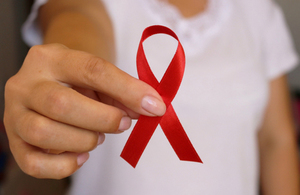13,500 people living with an undiagnosed HIV infection in the UK
New figures released on World AIDS day by Public Health England (PHE) also estimate 101,200 people in the UK are living with HIV.

Red AIDS awareness ribbon
According to new figures released on World AIDS Day (WAD) by PHE, an estimated 101,200 people are living with HIV in the UK. Of these more than 13,500 are living with an undiagnosed infection. PHE is working to reduce the number of people living with undiagnosed HIV by improving access to testing and is funding HIV home-sampling test kits which can be ordered online.
It is critical that anyone who is at risk of HIV, such as those living in high prevalence areas or who have recently had sex with a new or casual partner, gets tested because those diagnosed early can have a life expectancy almost matching that of people who are HIV free.
96% of people diagnosed with HIV are receiving treatment, which is good for their long term health, but also means almost all (94%) on treatment will have undetectable virus levels and pose virtually no risk of passing the virus on to sexual partners.
Of the 6,095 people diagnosed with HIV in 2015, 39% were diagnosed at a late stage of the infection. People who are undiagnosed or diagnosed late have poorer health outcomes and are more likely to die prematurely, they are also more likely to pass on the infection to others. NICE has published guidance to support increased uptake of HIV testing.
The guideline recommends HIV testing is offered in hospitals, A&Es and GP practices in areas of high HIV prevalence.
Dr Valerie Delpech, Head of HIV surveillance at Public Health England, said:
It is very worrying that so many people with HIV are living with an undiagnosed infection and may be putting sexual partners at risk.
Regular HIV testing ensures that people who are unaware of their infection are quickly diagnosed and start receiving safe and effective treatment. There are now several effective ways to prevent HIV transmission. We are again working with local authorities to fund the HIV home-sampling test kit, so that those people who are less likely to visit their GP, sexual health clinic for a HIV test – can take the test at home. It is essential that health services are aware of the prevalence of HIV in their local area and the potential demand for HIV testing.
Ultimately, it is important that people avoid the risk of developing HIV by wearing a condom and practicing safe sex.
In 2015, 6,095 people (4,551 men and 1,537 women) were diagnosed with HIV in the UK, 54% (3,320) of which were gay and bisexual men. The HIV epidemic still remains largely concentrated among gay and bisexual men and it is estimated that in 2015, 47,000 gay and bisexual men were living with HIV - 12% of who were undiagnosed. However, anyone can acquire HIV regardless of age, gender, ethnicity, sexuality or religion.
Nicola Blackwood, the Minister for Public Health said:
Stopping HIV is still a priority. It is clear that we must do more to reduce the number of undiagnosed cases however, significant progress is being made to diagnose HIV early and the proportion of people with undiagnosed HIV fell from 25% to 13% since 2010.
We will keep working with Public Health England and NHS England to encourage people, particularly those from African communities who are often diagnosed late, to get tested and fight the stigma associated with HIV.
Background
-
HIV in the UK 2016 report has been published by Public Health England.
-
PHE has published a new HIV testing report showing the need to strengthen HIV testing in areas where HIV levels are high and increase the ways we can reach people who are unaware they have HIV.
-
The HIV home sampling service offers an alternative to traditional testing offered by GPs and sexual health clinics, boosting the numbers of people getting tested. Last year 52% of kits sent out were returned.
-
People can find out more about how to order the HIV home-sampling test kit by visiting the website www.freetesting.hiv
-
The latest edition of Health matters focuses on increasing HIV testing and includes infographics to download, case studies, videos and blogs to help make the case for action at a local level. Health Matters is PHE’s resource for local authorities and health professionals, which brings together important facts, figures and evidence of effective interventions to tackle major public health problems.
-
Public Health England exists to protect and improve the nation’s health and wellbeing, and reduce health inequalities. It does this through world-class science, knowledge and intelligence, advocacy, partnerships and the delivery of specialist public health services. PHE is an operationally autonomous executive agency of the Department of Health. Follow us on Twitter: @PHE_uk and Facebook: www.facebook.com/PublicHealthEngland.
UKHSA press office: National Infection Service
UKHSA press office, infectious diseases
61 Colindale Avenue
London
NW9 5EQ